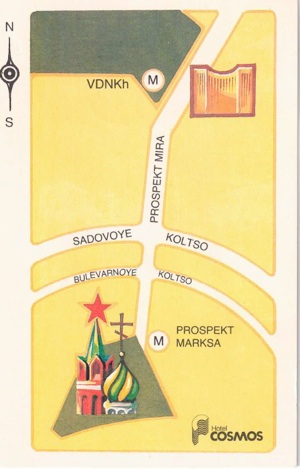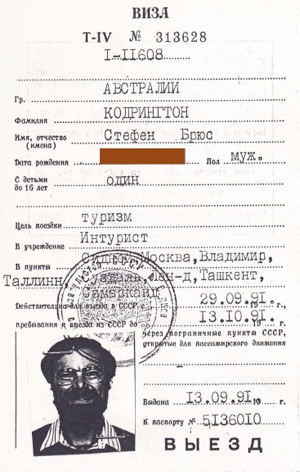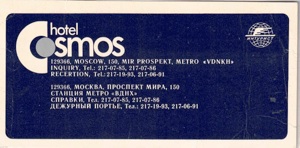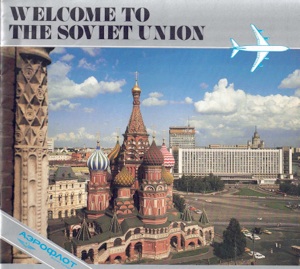USSR 1991
USSR 1991

USSR 1991

As our plane descended into Moscow this morning, my emotions were far more mixed than I had expected them to be. On one hand, I was really excited about coming here at last to experience some of the vitality I hoped to see following all the recent political upheavals. That sense of excitement and anticipation was fuelled by some articles in the Moscow News that was handed out to us on the flight, where articles talked about the “ex-Union” and “former Union” whenever it referred to the USSR.
On the other hand, memories of the grey, drab uniformity of my 1987 visit came flooding back to me, and the thought of “why am I subjecting myself to this system?” also crossed my mind. Any sense of foreboding was heightened by the evocative low-level (i.e. ground-hugging, one metre high) fog/mist which covered the damp ground as we landed.
The dismal lack of light as we landed reflected, I thought, the obscuring of the landscape by the mist, but as we taxied along the runway, it was announced that due to bad weather at Sheremetyevo (the big, international airport that was our destination), we had landed instead at Bykovo, another of Moscow’s four airports (but much smaller than Sheremetyevo). Bykovo is certainly drab compared with my memory of Sheremetyevo, especially in the mist with pylon spotlights throwing out silhouettes of randomly parked Aeroflot jets.
I’m writing this at 3:15am. I guess “they” don’t know what to do with us here at Bykovo. We have been left sitting on the plane now for just on an hour with the only announcement being “sorry for the wait, arrangements are being made”. Whether they intend to fly us across to Sheremetyevo, take us by bus, or bring an immigration/customs team across here to Bykovo, I have no idea.
Everyone in my study tour group is being very good humoured. They seem to be on a high after the great experience they had in Bangkok, together with a sense that the “real” experience is about to begin. I hope they’re right.
Our plane finally took off for Sheremetyevo after an hour and a half on the ground at Bykovo. It was a short 56 kilometre flight across Moscow from Bykovo to Sheremetyevo, and when we landed, no parking bays were available at the terminal. Consequently, we parked at some distance from the terminal and entered the airport by bus. Once inside, immigration and customs procedures were quick and straightforward – once we had woken up the immigration officers, quite a contrast to when I arrived in 1987 in a much larger Ilyushin Il-86.
Our hotel is the Hotel Cosmos, located a little to the north of central Moscow near VDNKh (the Exhibition Grounds of National Economic Achievements) and the Monument to Soviet Space Exploration. We arrived at the hotel at 5:00am and were received by a receptionist who spoke only Russian and German. In spite of some confusion as to whether we were to stay for one night (her expectation) or three nights (our expectation), we went to our rooms which were all located on the 8th floor, with views looking out over the space exploration monument and the exhibition grounds of national economic achievements. I managed to get a good sleep from 5:30am to 8:30am when I woke up to go downstairs and sort out the day – I had still not met our guide.
I found out that the guide was not coming until 10:00am, so I took the initiative to find the venue for breakfast and steered the members of the group downstairs accordingly. Breakfast, like all meals in Russia, was fairly heavy, comprising dry Russian black bread with sliced pressed meats and cheese, plus a cheese pikelet and sweet roll plus either tea or coffee without milk.
Following breakfast, I met our guide and sorted out arrangements for the day. Thus sorted, we began our city tour of Moscow at 11:00am with the aim of returning to the hotel by 2:15pm for lunch, and it worked very well. We began by driving south to the heart of Moscow, past the KGB Headquarters at Lubyanka Square with the now vacant plinth out the front where the statue of Felix Dzerzhinsky, founded of the KGB (or as it was called at the time, the NKVD) was torn down (as I watch on television) last month.
Our destination was Red Square, and it was brilliant! The weather today has been bright, sunny and surprisingly warm, so the appearance of Red Square was much brighter and vibrant than when I saw it in 1987 in a thick April fog. We arrived shortly before noon and so we were present to see the changing of the guard by goose-stepping soldiers at Lenin’s Tomb. I wonder how long that tradition will continue; I heard they are talking of dismantling the mausoleum and re-burying Lenin’s body in Leningrad.
It was fascinating to see that over the Kremlin, which is the government’s headquarters just off to the side of Red Square, the old pre-revolutionary Russian tricolour flag was flying once again after a gap of some 70-plus years on one of the buildings, but above one of the other buildings the red hammer-and-sickle Soviet flag was flying. Maybe the Soviet flag is flying over the buildings governing the Soviet Union while the old/new Russian tricolour flag is flying over those buildings governing Russia – although that would be puzzling as the Russian Soviet Republic’s headquarters is situated in a newer building known as the White House a few kilometres to the west on an embankment overlooking the Moscow River. It’s all very confusing.
I was also fascinated to see a small wooden structure with a golden orthodox dome on top of it at the opposite end of Red Square from St Basil’s Cathedral. I learned that this is the site of a new church that is going to be built, apparently the first new church to be built in Moscow since the Russian Revolution in 1917. To be known as the Kazan Cathedral, it will be built according to the architectural plans of the original Kazan Cathedral that once stood on the same site until 1936 when Stalin ordered its demolition and replacement with a public toilet, which he argued was much more useful for the masses than a place of worship. (Being Stalin, no-one dared to argue a contrary viewpoint!).
The new church is being built with a combination of state funds and private donations. Our guide told us that there is currently a great resurgence of interest in religion at the moment, especially as so many people have become disillusioned with communism since the events of last month. That also explains why we can see quite a number of Russian tricolour flags flying (rather than the communist red and blue hammer-and-sickle Russian flag), and some are even mounted at the foot of the obelisk where Dzerzhinsky’s statue was toppled last month.
Our guide commented further that many people were becoming disillusioned because reforms that had been promised last month were not being followed through or implemented, and in fact, Communist party groups and organisations in most workplaces are still functioning under different titles. Moreover, she commented that the shops all remain government-owned, so I asked: “which government, Soviet or Russian?”. She replied that no-one knows, as it has never been an issue before, and now they are all disputing the “split” between them. Later I asked whether most people would prefer the Union to remain or for each Republic to become its own separate nation. She commented that she thought most people would prefer the Union to remain intact, although she herself would prefer separation so that Russia could stop “carrying” (i.e. subsidising) the poor central Asian Republics (i.e. Kazakhstan, Kyrgyzstan, Tajikistan, Turkmenistan and Uzbekistan).
Leaving Red Square, we did a walking circuit of central Moscow, starting under the bridge where the West German pilot Mathias Rust had landed a light plane in May 1987 after (embarrassingly for the Soviet Union) evaded the country’s entire air defence system and moving on to the Moscow River embankment for a view of the Kremlin from across the river. We then continued along a circuitous route to Novodevichy (New Maiden) Convent.
Moscow is currently in autumn, and the leaves are turning and falling at the moment. Consequently, the city’s parklands are very picturesque, as was the convent’s compound. The domes of the buildings have recently been re-gilded in gold, and they shone spectacularly in the clear sunshine.
We boarded the bus again at the convent and drove past the 1980 Olympic Games complex, through the Lenin Hills and Moscow University, and back to the hotel for lunch, which was a fairly heavy mix of oily coleslaw, a mushroom and cheese “thing”, borscht (beetroot soup), beef and chips, with ice cream to finish.
After lunch we took the short drive across to the Exhibition of Economic Achievements, still labelled as “the world’s largest museum/exhibition”, but very run-down compared with my previous visit in 1987. Indeed, almost every pavilion was closed. Nonetheless, the socialist grandeur was imposing, particularly with the fountains turned on (unlike my previous visit), although with a slightly different eye it could have been classified as a trifle kitsch and in poor taste given the country’s lack of economic achievement over recent decades.
In the evening after dinner, I managed to contact Monica Attard, the ABC’s Moscow correspondent, by telephone. I am hoping she can come to the hotel and talk with us tomorrow evening, but we agreed to confirm arrangements tomorrow during the day.
Despite the long, tiring flight and the long day today, the group is in very good spirits and is getting along extremely well. This is a great relief to me, and helped me to really enjoy my day in Moscow today much more than I had expected. I am keeping well and feel fairly rested despite the disrupted sleeping pattern of the past few days.
I have been interested to see that Moscow has changed enormously since my previous visit in 1987, but I don’t think there have been many underlying, fundamental changes in people’s lives. I know this is a big generalisation, but people in general still seem as fatalistic and lacking in initiative as previously, with the obvious exception of a handful of emerging, small-time entrepreneurs. Many people may have decided that they don’t particularly like communism, but they seem to be at a loss to know how to go about organising an alternative. This is understandable; there’s no-one around who has experienced anything other than communism. I fear that everything will revert to its former state (without the excesses) due to apathy and inertia. There is no doubt that the country is at a real cross-roads, and it could go either way, or even simply disintegrate. It really is a fascinating time to be here.

Day 3
Moscow, Russia, USSR
Monday
30 September 1991


















